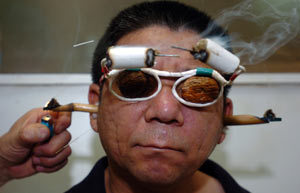China coordinates efforts to battle price hikes
Updated: 2010-11-20 09:02
(Xinhua)
BEIJING - Chinese ministries and local governments have coordinated efforts to combat price hikes by increasing grain supplies, clamping down on speculation and offering subsidies, as the central government has growing concerns about rising inflation.
In a move to head off price hikes, the State Administration of Grain will increase sales of grain supplies to meet the public's needs and stabilize market prices, the agency said in a statement posted on its website Friday.
| ||||
The authority will also send groups of staff to major grain production regions to inspect and guide purchases of autumn grain and regulate business practices, it added.
The statement said the move was designed to protect farmers' interests and maintain moderate prices in the grain market.
Further, the Ministry of Agriculture announced Friday that it will work to add 8 million mu (0.53 million hectares) of planting areas for vegetables and 2 million mu for potatoes to stabilize agricultural production and increase vegetable supplies during the winter.
Also, Zhou Bohua, head of the State Administration of Industry and Commerce, said the administration will "seriously" work to prevent the hoarding of agricultural products, forcing up prices and other speculative practices.
These measures echoed the central government's call to tame price rises.
China's State Council, or the Cabinet, on Wednesday announced price control guidelines to reassure consumers facing rising inflation. The efforts mainly included imposing temporary price controls on important daily necessities and production materials when necessary, and urging local authorities to offer temporary subsidies to needy families.
In addition, the government will work to ensure market supplies and strengthen market supervision.
Local governments also unveiled specific measures intended to help people pressured by the higher cost of living. The city government of Changchun, capital of northeastern Jilin province, has announced it will hand out subsidies to more than 40,000 low-income households this month, distributing 50 yuan to each household.
Also, Mao Zhiming, an official with the city government of Taiyuan of northern Shanxi province, said the city will offer subsidies to low-income families each month beginning from the first month when the local consumer price index (CPI) rises above 3 percent and continuing until the third month that the CPI remains below 3 percent.
These steps were introduced after China's CPI, a major gauge of inflation, rose to a 25-month high of 4.4 percent in October. The increase was mainly pushed up by the 10.1 percent surge in food prices, which accounts for one-third of the basket of goods used to calculate the country's CPI.
Gao Fan, economics professor with Shanghai-based Fudan University, blamed speculation and excessive liquidity for surging prices of agricultural products in China.
He said that within the country part of the speculative capital, which moved to the agricultural market from the property market after the government fought property speculation, pushed up prices of agricultural products.
Further, the US has pumped excessive money into the global market with its new round of quantitative easing monetary policy, which has resulted in rising prices of commodities, including grain, and helped import inflation to China, he said.
"If the excessive capital can't be effectively diverged, the situation may get worse," he warned.
China has been moving to mop up excessive liquidity to combat inflation. The People's Bank of China, the country's central bank, announced Friday it would raise capital reserve requirements by 50 basis points for its banks for the fifth time this year in order to "appropriately control" credit and liquidity.
Also, Sun Lijian, professor with Fudan University, said the government should continue to speed up increases in grain supplies, curbing speculation and adding strategic reserves to rein in additional fast gains in prices.
Chinese Vice Premier Hui Liangyu, during his inspection tour to Guangdong and Fujian, lasting from Monday to Friday, called for greater efforts to ensure sufficient supplies of major agricultural products to satisfy increasing demand and help raise farmers' incomes.
Paper's Digest

China bags Asiad team tennis title after 24 yrs
Wimbledon semifinalist Li Na led host China to capture the team tennis title on Tuesday at the Asian Games, accomplishing her Asiad tour with three consecutive victories.
China rate rises no panacea to curb inflation: PBOC adviser
Specials

Russian possessed with TCM
Born into a family of doctors, Maxime became interested in Traditional Chinese Medicine (TCM) at the age of 12, after hearing about TCM theories such as health preservation and recuperation.

Acupuncture takes stab at UNESCO list
Acupuncture and Peking Opera have been selected as candidates for UNESCO intangible cultural heritage status.

The wedding coach comes back to life
A groom carries his bride from a wedding coach in Xuchang, Henan province, Nov 11, 2010. Produced a local factory, various original hand-made wedding carriages were displayed on the streets, attracting young people chasing fashion and an environment-friendly lifestyle.




